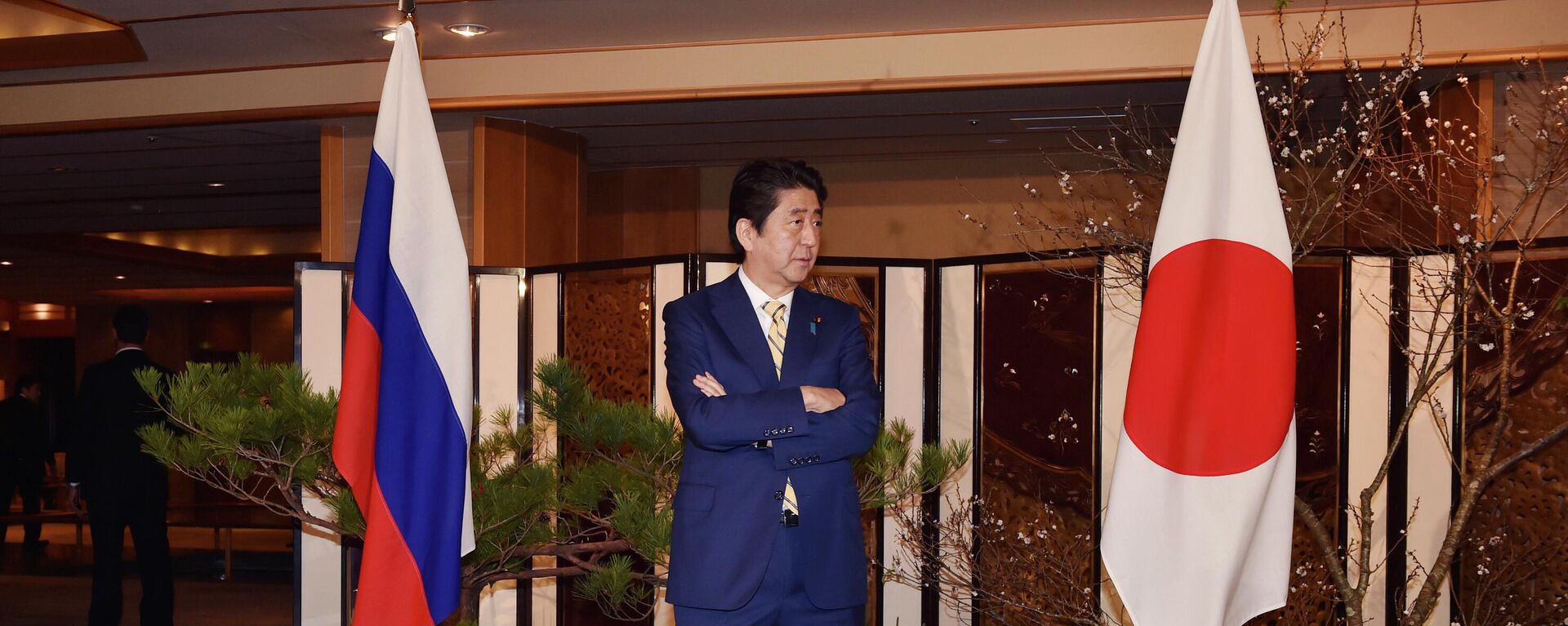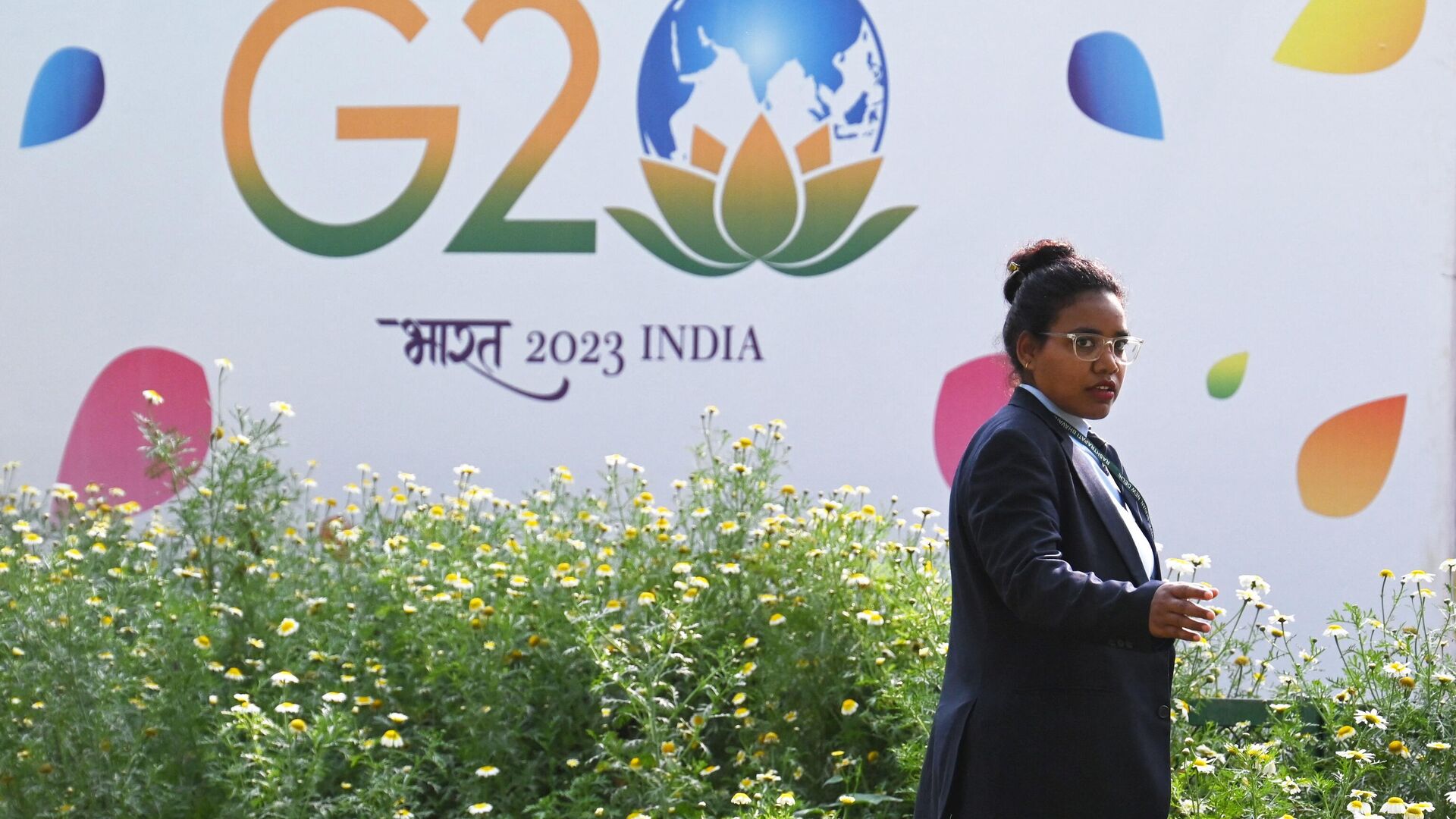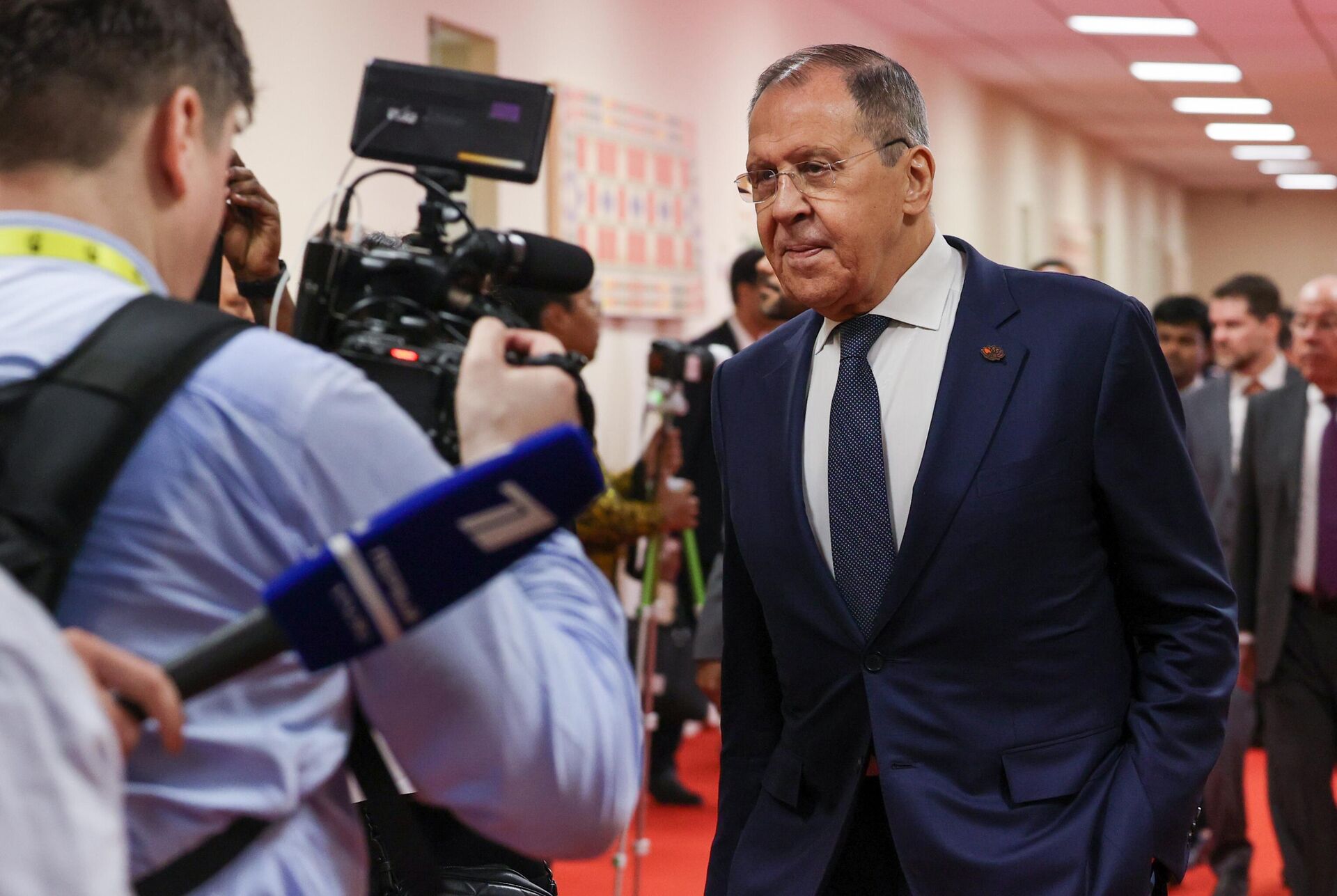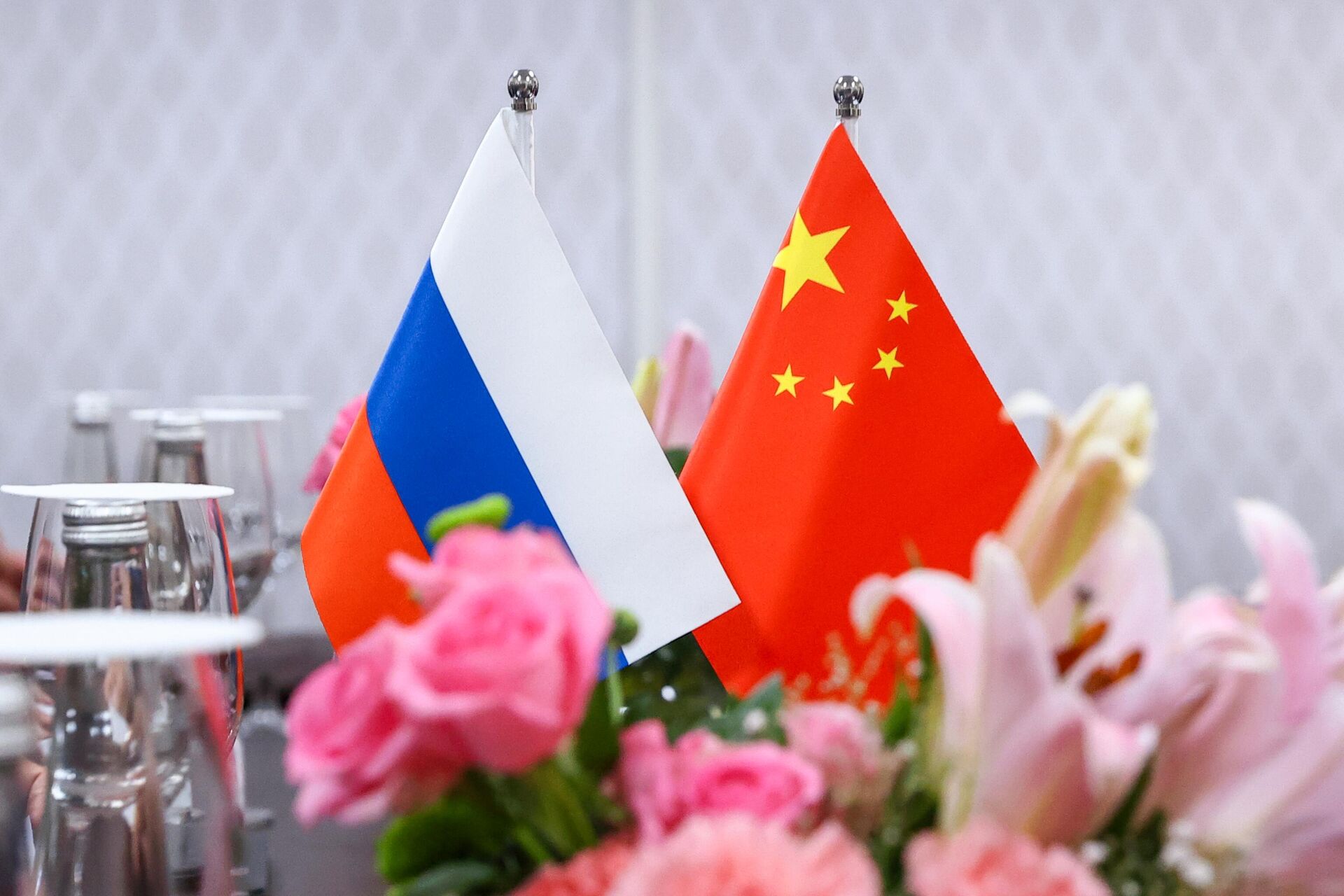https://sputnikglobe.com/20230302/g20-roundup-new-payment-systems-supply-chains-will-weaken-wests-grip-on-global-south-1107957479.html
G20 Roundup: New Payment Systems, Supply Chains Will Weaken West’s Grip on Global South
G20 Roundup: New Payment Systems, Supply Chains Will Weaken West’s Grip on Global South
Sputnik International
Officials from the world’s 20 largest economies met in Delhi, India Thursday for the second and final day of the G20 Foreign Ministers’ Meeting. The event was... 02.03.2023, Sputnik International
2023-03-02T19:10+0000
2023-03-02T19:10+0000
2023-03-02T19:10+0000
analysis
g20
g20 summit
g20 ministerial meeting
india
russia
multipolarity
payment system
trade
corridors
https://cdn1.img.sputnikglobe.com/img/07e7/03/02/1107958610_0:158:3077:1889_1920x0_80_0_0_47832fc832ac89c9dd7e76a5bc990f3a.jpg
Thursday’s G20 Foreign Ministers' Meeting in Delhi was the second time the bloc failed to reach a consensus on a joint communique since last week’s Finance Ministers' Meeting in Bengaluru, India.Instead, the Indian hosts released a "Chair's Summary and Outcome Document" which, as the name suggests, summarized what officials said and some of the disagreements between them.A Russian-Chinese push to demand a fair and impartial investigation into the Nord Stream blasts in the communique was not mentioned.Countries formally agreed to take steps to "strengthen" multilateralism, that "the United Nations must be responsive to the entire membership," and that problems in this area "can only be addressed through reinvigorated multilateralism, reforms and international cooperation." G20 members also expressed "deep concerns" over the global "challenges" to food and energy security, and the need to maintain "undisrupted, sustainable, and resilient supply chains."The document also paid lip service to the climate change and global health agendas, as well as development cooperation, emerging technologies, counterterrorism, and the battle against illicit drugs.G20 is Not G7The reason for the lack of consensus is pretty obvious and it's not necessarily a bad thing, says Manjeet Kripalani, executive director of Gateway House, an independent Mumbai-based foreign policy think tank. Unlike the Group of 7 (G7), which is a club exclusive to rich, mostly Western powers, the G20 includes a diverse mix of countries from the West, East, and Global South.Dr. Raj Kumar Sharma, a fellow at the University of Delhi’s Delhi School of Transnational Affairs, agreed, noting that as the host country, India had an obligation "not to take sides and reflect concerns of involved parties in the statement," balancing the G7 countries’ push to condemn Russia and use the term "war" with the fact that "many G20 countries have not taken sides in this crisis" and "have stayed neutral.”For his part, Srikanth Kondapalli, dean of Jawaharlal Nehru University’s School of International Studies, said it was important to highlight India’s position on Ukraine and the current international security crisis more broadly.During the G20 event, Indian Prime Minister Narendra Modi, Foreign Affairs Minister S. Jaishankar, and Russian Foreign Minister Sergey Lavrov each made statements criticizing the current global order, and calling for greater representation of developing countries in international institutions."It is high time to reform the UN Security Council," Lavrov said at a news conference Thursday, highlighting Moscow’s agreement with India on the need to reform the top global decision-making institution. Foreign Minister Jaishankar echoed these sentiments, pointing out that as "the number of members of the United Nations has quadrupled" over the past 80 years, the existing Security Council architecture "neither reflects today’s politics, economics, demographics or aspirations."Kondapalli agreed that the current system is broken and needs fixing, saying the current Security Council often engages in talk instead of taking action.For example, "there was no single statement from the Security Council on COVID-19, which has killed nearly six million people so far. And no remedial measures proposed by the Security Council in regard to this. It did have a vaccination program, but dependent on individual states’ contribution, or that vaccination drive. But nevertheless, it didn't have any position on COVID-19, which basically disrupted entire economies, lives, supply chains, manufacturing sector, the health care-related infrastructure, and so on," the observer said.Political multilateral institutions like the Security Council aside, multilateralism has also failed in other spheres, like the World Health Assembly and the International Monetary Fund, Kondapalli said. "In terms of distributing the finances or infrastructure, especially among the Global South, the G77 countries, there is a certain crisis even in economic, multilateral institutions, apart from the political multilateral institutions," the academic noted.Kondapalli emphasized that changes to the global decision-making order will require rich countries to be more "alert" to the needs of the Global South, because many of the problems caused by developed countries "spill over into effects on the Global South," with the Ukraine crisis being a perfect example."The Ukrainian conflict resulted in energy prices going up [...] Everything moves on energy, which means the transportation, food materials, everything else is dependent on transportation. As a result of this, there is a food crisis increasing, inflation rising, fertilizer prices rising. So these are major concerns for the developing countries, or the Global South. What Prime Minister Modi is trying to say is that the effects of any conflict will have a drastic impact on developing countries," the scholar said.'Exciting' Opportunity to Build a Fairer WorldDuring his post-summit press conference, Lavrov said that Russia would continue to "focus on forming reliable transport corridors, independent payment systems, and the expansion of payments in national currencies within the framework of BRICS, SCO and the Eurasian Economic Union."Kripalani emphasized that moves by Russia, China, and others to break out of dependence on Western institutions and systems "is actually very exciting," because it potentially opens the door to a new, fairer world order.Finally, Srikanth Kondapalli expressed a more skeptical view, pointing out that although new payment systems and currency swap transactions have helped reduce countries' dependence on the West, it must be recognized that as of this moment, the dollar continues to maintain a 50%+ share of transactions globally, with the pound, the euro, and the yen accounting for part of the rest."So I'm not very sure how successful this diversification to local currencies will be,” the observer concluded.
https://sputnikglobe.com/20230211/japans-abe-european-leaders-opposed-sanctions-against-moscow-at-2014-g7-summit--memoir-reveals-1107336119.html
russia
Sputnik International
feedback@sputniknews.com
+74956456601
MIA „Rossiya Segodnya“
2023
News
en_EN
Sputnik International
feedback@sputniknews.com
+74956456601
MIA „Rossiya Segodnya“
Sputnik International
feedback@sputniknews.com
+74956456601
MIA „Rossiya Segodnya“
g20, g20 summit, g20 ministerial meeting, india, russia, multipolarity, payment system, trade, corridors
g20, g20 summit, g20 ministerial meeting, india, russia, multipolarity, payment system, trade, corridors
G20 Roundup: New Payment Systems, Supply Chains Will Weaken West’s Grip on Global South
Officials from the world’s 20 largest economies met in Delhi, India Thursday for the second and final day of the G20 Foreign Ministers’ Meeting. The event was filled with acrimonious exchanges over Ukraine and the sabotage of Nord Stream, and a joint communique could not be agreed on. Sputnik reached out to Indian observers for key takeaways.
Thursday’s G20 Foreign Ministers' Meeting in Delhi was the second time the bloc failed to reach a consensus on a joint communique since last week’s Finance Ministers' Meeting in Bengaluru, India.
“There were issues. The issues, very frankly, concerned the Ukraine conflict on which there were divergences,” Indian Foreign Minister S. Jaishankar told reporters following the meetings.
Instead, the Indian hosts released a "Chair's Summary and Outcome Document" which, as the name suggests,
summarized what officials said and some of the disagreements between them.
"Recognizing that the G20 is not the forum to resolve security issues, we acknowledge that security issues can have significant consequences for the global economy," the summary read, pointing to a lack of consensus on Ukraine.
A Russian-Chinese push to demand a fair and impartial investigation into the Nord Stream blasts in the communique was not mentioned.
Countries formally agreed to take steps to "strengthen" multilateralism, that "the United Nations must be responsive to the entire membership," and that problems in this area "can only be addressed through reinvigorated multilateralism, reforms and international cooperation."
G20 members also expressed "deep concerns" over the global "challenges" to food and energy security, and the need to maintain "undisrupted, sustainable, and resilient supply chains."
The document also paid lip service to the climate change and global health agendas, as well as development cooperation, emerging technologies, counterterrorism, and the battle against illicit drugs.
The reason for the lack of consensus is pretty obvious and it's not necessarily a bad thing, says Manjeet Kripalani, executive director of Gateway House, an independent Mumbai-based foreign policy think tank. Unlike the Group of 7 (G7), which is a club exclusive to rich, mostly Western powers, the G20 includes a diverse mix of countries from the West, East, and Global South.
"The G7 is a sort of homogeneous body. They all have the same views. They trade with each other. They're all advanced economies. The G20 is more fair, it represents the world a little bit better, it's a mixture of poor countries, rich countries, different continents. And so obviously, their view is going to be different. I think that the G20 represents the world better. And of course, the G7 is going to think differently," Kripalani told Sputnik.
Dr. Raj Kumar Sharma, a fellow at the University of Delhi’s Delhi School of Transnational Affairs, agreed, noting that as the host country, India had an obligation "not to take sides and reflect concerns of involved parties in the statement," balancing the G7 countries’ push to condemn Russia and use the term "war" with the fact that "many G20 countries have not taken sides in this crisis" and "have stayed neutral.”

11 February 2023, 07:30 GMT
For his part, Srikanth Kondapalli, dean of Jawaharlal Nehru University’s School of International Studies, said it was important to highlight India’s position on Ukraine and the current international security crisis more broadly.
"Where does India stand in this? I think the Samarkand Meeting of the Shanghai Cooperation Organization in September last year [made] the Indian position clear. One is, of course, neutrality in the current conflict," Kondapalli said. There are some differences between Moscow and Delhi, the observer noted, including India’s lack of criticism toward NATO expansion, which countries like China have pointed to as a root cause of the Ukraine crisis. But generally, Delhi has consistently struck to neutrality, and “did not go along with many G7 countries in terms of the United Nations debates, the General Assembly debates, or the Human Rights Council debates, or other multilateral institution debates on this issue."
During the G20 event, Indian Prime Minister Narendra Modi, Foreign Affairs Minister S. Jaishankar, and Russian Foreign Minister Sergey Lavrov each made statements criticizing the current global order, and calling for greater representation of developing countries in international institutions.
"It is high time to reform the UN Security Council," Lavrov
said at a news conference Thursday, highlighting Moscow’s agreement with India on the need to reform the top global decision-making institution. Foreign Minister Jaishankar
echoed these sentiments, pointing out that as "the number of members of the United Nations has quadrupled" over the past 80 years, the existing Security Council architecture "neither reflects today’s politics, economics, demographics or aspirations."
"Important institutions that provide global governance are dominated by the Western countries, whether it is the UN Security Council or the financial mechanisms like the IMF and World Bank. India along with Russia has been supportive of their reform to include members from the Global South. This would not only democratize their decision-making, but would also reflect interests of the developing countries in global governance structures," Dr. Sharma said, commenting on the Russian and Indian ministers' positions.
Kondapalli agreed that the current system is broken and needs fixing, saying the current Security Council often engages in talk instead of taking action.
For example, "there was no single statement from the Security Council on COVID-19, which has killed nearly six million people so far. And no remedial measures proposed by the Security Council in regard to this. It did have a vaccination program, but dependent on individual states’ contribution, or that vaccination drive. But nevertheless, it didn't have any position on COVID-19, which basically disrupted entire economies, lives, supply chains, manufacturing sector, the health care-related infrastructure, and so on," the observer said.
Political multilateral institutions like the Security Council aside, multilateralism has also failed in other spheres, like the World Health Assembly and the International Monetary Fund, Kondapalli said. "In terms of distributing the finances or infrastructure, especially among the Global South, the G77 countries, there is a certain crisis even in economic, multilateral institutions, apart from the political multilateral institutions," the academic noted.
Kondapalli emphasized that changes to the global decision-making order will require rich countries to be more "alert" to the needs of the Global South, because many of the problems caused by developed countries "spill over into effects on the Global South," with the
Ukraine crisis being a perfect example.
"The Ukrainian conflict resulted in energy prices going up [...] Everything moves on energy, which means the transportation, food materials, everything else is dependent on transportation. As a result of this, there is a food crisis increasing, inflation rising, fertilizer prices rising. So these are major concerns for the developing countries, or the Global South. What Prime Minister Modi is trying to say is that the effects of any conflict will have a drastic impact on developing countries," the scholar said.
Manjeet Kripalani agreed with this assessment, but said it's worth emphasizing that sanctions, and not the Ukraine crisis alone, must be given their fair share of the blame. “They have prevented the free flow of particularly energy and food, which is related to the normal trading patterns. So, it is very important to call this out, because there is one side of the world which is putting out its story on the ‘war,’ but actually it is the sanctions that have done it, so it is very important to call this out,” she said.
'Exciting' Opportunity to Build a Fairer World
During his post-summit press conference, Lavrov
said that Russia would continue to "focus on forming reliable transport corridors, independent payment systems, and the expansion of payments in national currencies within the framework of
BRICS, SCO and the Eurasian Economic Union."
Kripalani emphasized that moves by Russia, China, and others to break out of dependence on Western institutions and systems "is actually very exciting," because it potentially opens the door to a new, fairer world order.
"It used to be that in the old days, the Western banks always were the ones that called the shots. That is no longer going to happen. There will be banks and financial intermediaries from around different parts of the world. In fact, it's going to become a financially more equal world. On logistics - in fact, it is very good, because, again, the systems that exist have been disrupted. But what we are going to see, and there is going to be a renewed push, is to get the Eurasian systems and the customs unions, etc. to start reactivating. For instance, the international North-South Transport Corridor, which runs from Central Asia down to Iran, this is now going to be looked at again, because these are connectivity projects that are closer to West Asia, South Asia, Central Asia, maybe Russia and China. And Asia will see different kinds of connectivity, maybe maritime connectivity projects, I'm not sure. But certainly, these multimodal transport corridors are going to be looked at now with great interest," the expert said.
Finally, Srikanth Kondapalli expressed a more skeptical view, pointing out that although new payment systems and currency swap transactions have helped reduce countries' dependence on the West, it must be recognized that as of this moment, the dollar continues to maintain a 50%+ share of transactions globally, with the pound, the euro, and the yen accounting for part of the rest.
"So I'm not very sure how successful this diversification to local currencies will be,” the observer concluded.





